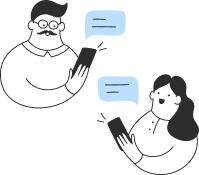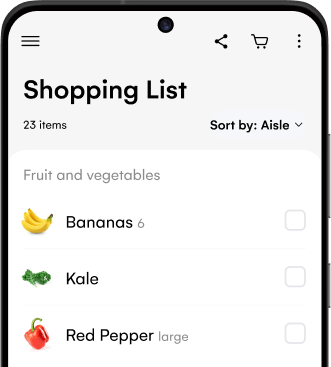Estimated reading time: 6 minutes
The idea of intuitive eating was first introduced in the book “Intuitive Eating: A Revolutionary Program That Works” by Evelyn Tribole, a registered dietitian, and Elyse Resch, a registered dietitian and clinical nutritionist. The book was first published in 1995 and has since become a best-seller.
Plan meals together! Share this plan with your family

Tribole and Resch developed the concept of intuitive eating based on their work with clients who had struggled with disordered eating patterns and negative body image. They noticed that restrictive dieting often leads to feelings of guilt, shame, and failure (sound familiar?). And that restrictive diets can contribute to disordered eating and poor body image. They created the intuitive eating approach to help people develop a healthy relationship with food and to learn to trust their body’s natural hunger and fullness cues.
That’s where and when the concept came about, but it’s now fairly well-ingrained into wellness, diet, and healthy lifestyles. Admittedly though, intuitive eating can sound a little bit…well…made up. Especially if you don’t know what it entails.
So what’s it all about really? And more importantly, does it work?

What is intuitive eating?
Intuitive eating is an approach to nutrition and eating. Instead of restricting food choices, intuitive eating focuses on listening to your body’s natural hunger and fullness cues and trusting your body to guide your eating habits. It’s key to recognize that it isn’t a diet, but an approach to nutrition.
It encourages you to eat response to physical hunger and to stop eating when they feel satisfied, rather than following strict diets or eating plans. The goal of intuitive eating is to develop a positive relationship with food and to learn to trust your body to know what it needs.
The goal isn’t to lose or gain weight, but to honor your body’s needs and trust that listening to it will guide you as to what you need to eat. Instead, it helps you focus on foods that work best for your overall physical and mental health.
(Thinking of mindful eating instead? Read up on that approach here.)
Doesn’t that mean you can just eat anything?
Does it sound as if this means you can just eat whatever you want, whenever you want? What if you only want to eat donuts or KFC for three weeks?
Intuitive eating isn’t quite as simple as that. It does mean that no particular food is off limits. It’s important to note that with intuitive eating, there’s no restriction, but also it’s not a free pass to eat only one type of food. The idea is to listen to your body and give it what it needs. But the trick is in understanding exactly what your body is saying!
To do that, it’s important to be totally in tune with your emotions, feelings and cravings. It also means anticipating how certain foods might make you feel.
So if you’re craving greasy fried chicken but know it will make you feel sluggish and unwell later, you might opt for a baked chicken breast with oven fries instead. Or you might accept that trade off occasionally and have a KFC takeout. Eating for pleasure without guilt or shame is part of mastering intuitive eating too.

Does intuitive eating work?
The concept of intuitive eating has gained popularity in recent years, with more researches and medical professionals recognizing the benefits of this approach. Research has shown it to be an effective approach for improving physical and mental well-being, improving body satisfaction and reducing disordered eating patterns.
Create your own recipes from scratch

Here’s why it might be beneficial:
- Improved body satisfaction: Intuitive eating can lead to improved body satisfaction and self-esteem, as it encourages individuals to honor their body’s natural shape and size, rather than trying to change it.
- Better physical health: Intuitive eating can improve physical health by promoting a more balanced and varied diet, as well as helping to prevent disordered eating patterns and weight cycling.
- Better mental health: Intuitive eating can improve mental health by reducing stress and anxiety associated with strict dieting and negative body image. It encourages individuals to focus on their overall well-being rather than their weight.
- Increased trust in your body: Intuitive eating can help you to develop a better relationship with food by learning to trust your body’s natural hunger and fullness cues.
- Increase in flexibility: Intuitive eating allows for flexibility in food choices and meals, it allows individuals to eat what they want and when they want, rather than feeling restricted.
But of course, your definition of something ‘working’ might be different to the next person’s. If you’re looking to put on a lot of muscle mass, for instance, it probably isn’t the right approach. If you’re looking to improve your relationship with food, perhaps it is.
Is intuitive eating right for me?
If intuitive eating sounds like an approach you might be interested in, perhaps you can see yourself in one of the descriptions below? While there’s no set in stone person who the approach works for, it can be helpful if:
- You are tired of restrictive diets. If you have tried multiple diets and found that they don’t work for you long-term, or if you are tired of feeling restricted or guilty when it comes to food.
- You want to develop a better relationship with food. If you want to learn to trust your body’s natural hunger and fullness cues and develop a more positive relationship with food, intuitive eating can be beneficial.
- You are looking for a sustainable, long-term approach to nutrition. Intuitive eating can encourage you to make peace with food and listen to your body more closely.
- You want to improve your physical and mental well-being. Intuitive eating can promote balanced and varied eating patterns, improve body satisfaction, and reduce stress and anxiety associated with dieting.

A word of caution
All those benefits are great, but intuitive eating isn’t necessarily the best fit for everyone. It may be particularly difficult for people who have a history of disordered eating or an eating disorder, as it may trigger disordered thoughts or behaviors.
And as mentioned earlier, it also isn’t a one-size-fits-all solution. If your goal is to lose weight or gain muscle mass, for example, it might not create the results you want. That’s not to say you can’t reach a healthy body weight with intuitive eating, just that making your body look a certain way isn’t the primary goal.
It is important to note that intuitive eating is not a quick fix or a weight loss program. Taking it up means more than just eating whatever you want and calling it intuitive! It requires time, patience, and support from a qualified healthcare professional to help you learn to trust your body again.
Words by Sophie Baker



